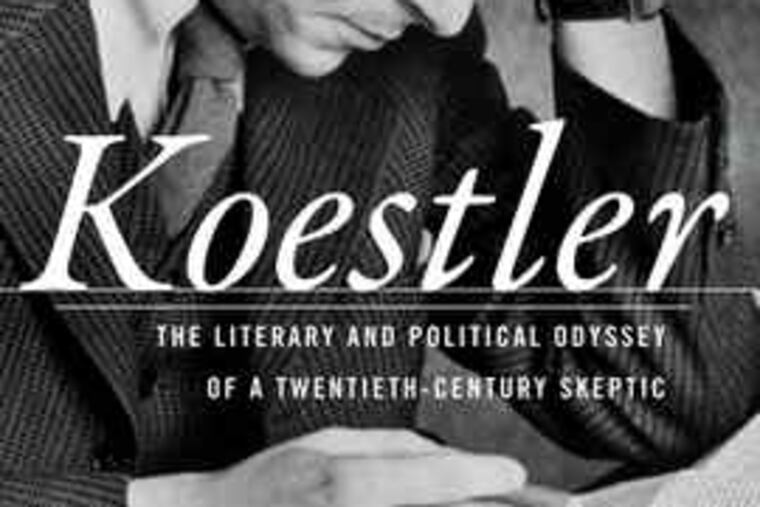At center of 20th century's storms
This exhaustive and engaging biography chronicles a life that had the fortune, and sometimes misfortune, to intersect with many of the seismic events and major intellectuals of the 20th century.

The Literary and Political Odyssey of a Twentieth-Century Skeptic
By Michael Scammell
Random House. 720 pp. $35.
nolead ends nolead begins
Reviewed by Chris Hedges
This exhaustive and engaging biography chronicles a life that had the fortune, and sometimes misfortune, to intersect with many of the seismic events and major intellectuals of the 20th century.
As a boy, Arthur Koestler stood in a square in 1918 in his native Budapest to witness the birth of the short-lived Hungarian Republic after 200 years under the Habsburgs and its overthrow by a communist dictatorship that, in turn, collapsed a year later. As a university student, he haunted the dives of postwar Vienna. He became the personal secretary of the Zionist leader Vladimir Jabotinsky in Palestine. With Langston Hughes, he wandered through the bleak wastelands of Joseph Stalin's Soviet Union - and censored from his writings all mention of the awful famine gripping the Ukraine.
During the Spanish Civil War, he was a reporter until his capture and imprisonment in 1937 by the fascists. He was in Berlin to witness the rise of Adolf Hitler. He served in the French Foreign Legion and the British army in World War II and spent drunken nights in Paris with Jean-Paul Sartre and Albert Camus. The latter had a passionate affair with Koestler's lover - but that did not disrupt the friendship.
Whether the cause was nationalism, Zionism or communism, the pattern of Koestler's life was to become a zealot first, then revolt, then emerge as a scathing apostate who attacked the beliefs that once consumed him. His intellectual and emotional development, as Scammell notes, revolved around "infatuation with the myth, experience of the reality, and disillusionment with the outcome."
Of Koestler's giddy embrace of communism while living in Berlin in the 1930s, Scammell writes: "He loved to see his life in terms of burned bridges and leaping off cliffs, blinding revelations and psychological revolutions (he had described his conversion to Zionism in almost identical terms), but no one conveyed better than he the emotional intensity of conversion to a new creed, and there is little doubt that this is how he experienced it. It was another semimystical experience, religious in all but name, and promised the same sort of relief from inner tensions as had Zionism some six years earlier."
Koestler was a polyglot whose intellectual interests ranged from existentialism and Marxism to the intricacies of electric current and physics. He wrote books in his native Hungarian, switched to German, and spent his last few decades writing in English.
He had a dark and vicious temper, deep insecurities from a troubled and turbulent childhood, and could be vain, rude and pompous. He managed to bed innumerable women, including the wives of many acquaintances. His lovers endured verbal and at times physical abuse. He committed suicide in 1983, along with his much younger and healthier wife, Cynthia, in his home in London, perhaps his final and supreme act of misogyny.
His work as a writer was prodigious if wildly uneven. He left behind a handful of masterpieces, from The Spanish Testament, a moving account of his imprisonment in Spain, to Scum of the Earth, about his flight with desperate refugees from France to escape the Nazi invasion, to his classic Darkness at Noon, a psychological dissection of the Communist Party members consumed by Moscow show trials.
He also left behind pseudoscientific books - he was fascinated by the paranormal - and forgotten, third-rate novels. His best writing is memoir, journalism or lightly fictionalized autobiography such as Darkness at Noon. He did not rank with writers such as George Orwell, a friend whom he deeply admired, but he came close.
Scammell's biography, however, is more than the story of a life. It is also a fascinating account of the potent ideological movements and social upheavals in Europe engendered by nationalism, Zionism, communism and fascism, upheavals that swept up tens of millions of ardent followers. Scammell allows us to see and experience these movements through the eyes of one of the century's most astute critics of the human condition - a man who was usually standing amid the frenzied crowds. Koestler's observations are particularly useful because he, unlike Orwell, was seduced by many of these movements before turning on them.
Koestler's sordid personal life is redeemed by his fierce intellectual honesty and courage. It is a testament to these qualities that his friends and former lovers, who deplored his conduct, usually remained loyal and affectionate. The torments he inflicted on friends were dwarfed by those he inflicted on himself. Janine Graetz, a mistress who bore him a daughter he never met, told him: "You are kind and even self-sacrificing to people who are indifferent to you, but if you agree to live with somebody, you become inhuman to them and yourself, and torture them the way you torture yourself."
Koestler's torment and anguish, his quest for an unachievable peace, and his crushing disillusionment, were at once his greatest weakness and his greatest strength. His turbulent inner life, which could make him repugnant, also propelled him to produce some of our greatest and most enduring social criticism.